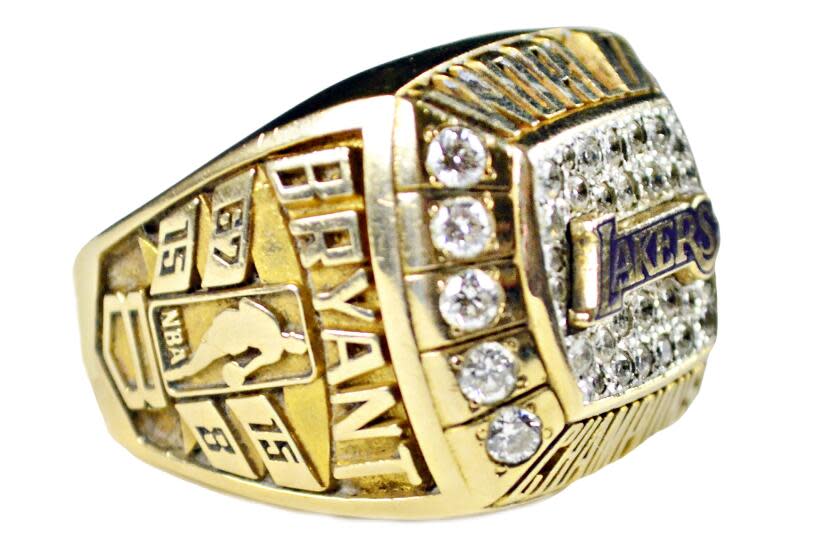Lakers NBA title ring Kobe Bryant gifted to father sells for nearly $1 million

Eleven years after Joe "Jellybean" Bryant sold at auction a Lakers' 2000 NBA championship ring gifted to him by his son, Kobe Bryant, the ring was sold again by the same auction house for more than five times as much: $927,200.
The winning bid was $760,000, with a buyer's premium — the cut taken by the Goldin auction house — accounting for the rest. The identities of the buyer and seller are not disclosed by the auction house, so it isn't known whether Bryant's wife, Vanessa Bryant, bought the ring to return it to the family four years after the death of her husband and daughter Gianna in a helicopter crash.
The bidding began slowly but became frenzied Saturday, the last day of the auction. Bidding began at $191,000, but 16 bids were placed during the last 22 minutes of the auction.
Read more: Plaschke: Kobe Bryant's legacy shines bright four years after his death
The nearly $1-million sticker price is a record for an NBA championship ring, shattering the previous high of $705,000 paid for Hall of Fame center Bill Russell's 1957 ring, commemorating the first of his 11 titles with the Boston Celtics.
This is the third time Bryant's ring has been sold since it was auctioned in 2013 by his parents, Joe and Pam. It was most recently sold a year ago by SPC Auctions. The ring comes with a letter of authenticity signed by Pam Bryant, which has accompanied the ring since the first time it was auctioned.
"Chain of provenance is extremely important," said Ken Goldin, chief executive of the Goldin auction house. "The original LOA should accompany a collectible ‘forever,’ so this ring contains the original letter, just like a Mickey Mantle item with a Mantle LOA from 1975 would still be given with a purchase of that same item in 2024."
Read more: Vanessa Bryant helped design Kobe's special Hall of Fame exhibit
Bryant was dismayed in 2013 after he learned his parents were attempting to sell the ring and other treasured mementos, including a signed basketball from the 2000 Lakers team, his 1996 Pennsylvania high school championship ring, sweatsuits he wore at Lower Merion (Pa.) High and a surfboard he used as a child.
“When u give Give GIVE and they take Take TAKE at wat point do u draw a line in the sand?” Bryant tweeted, adding the hashtags “hurt beyond measure,” “gave me no warning,” and finally, “love?”
Bryant took his parents to court, saying he never granted them permission to sell the items. Pam Bryant said in a court filing that she planned to purchase a Nevada home with the $450,000 advance she received. Lawyers worked out a settlement allowing Bryant’s parents to auction six items of memorabilia totaling $500,000 — including the ring — and they issued a public apology.
“We regret our actions and statements related to the Kobe Bryant auction memorabilia,” the 2013 statement from Joe and Pam Bryant read. “We apologize for any misunderstanding and unintended pain we may have caused our son and appreciate the financial support that he has provided to us over the years.”
Read more: What happened with Kobe Bryant's sexual assault case
This time around, Joe and Pam Bryant made it clear they had nothing to do with Saturday's sale of the ring, providing a statement to The Times that said: “We want to make it unequivocally clear that we have no involvement in this sale of our son’s 2000 championship ring. The mere existence of the auction has reopened a deep, painful wound.
"We seek peace, and the opportunity to grieve with dignity. We appreciate your understanding and respect for our family’s privacy at this time. Thank you, and may God bless you.”
Goldin was also the auction house when Joe and Pam Bryant first sold the ring in 2013 for $173,000. Ken Goldin said that an auction house selling the same item more than once is "extremely common."
"It happens every auction with every auction house, especially in sports collectibles," he said. "We have sold some specific trading cards, for example, five or six times since 2012."
This story originally appeared in Los Angeles Times.


